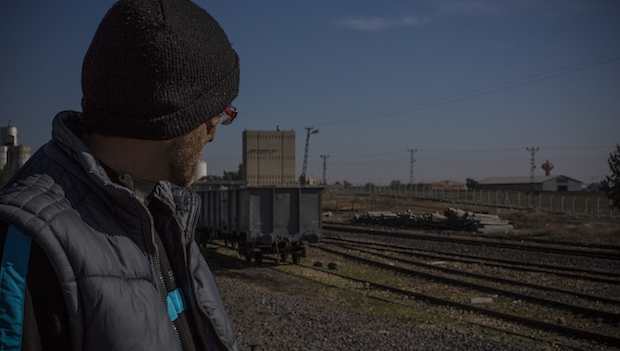
Abu Hussein looks across the border to his house in Tel Abyad, Syria. (Asharq Al-Awsat/Hannah Lucinda Smith)
Akçakale, Asharq Al-Awsat—He cut the loneliest of figures, even in the middle of the crowd. Abu Khaled sat in his wheelchair, looked towards his homeland through the sharp metal fence, and he waited. He had been waiting for a week already. No one could tell him how many more days of waiting lay ahead of him.
The titanium pins that held his left leg together entered his body through wounds that still looked raw, but he insisted that it didn’t matter. All he wanted to do was go home. “I just want to be back with my family,” he said.
Hundreds of Syrians have waited at the Akçakale border crossing in Turkey for the past two weeks, hoping that it will reopen so that they can return to their homes. Their stories all mirror that of Abu Khaled’s. Behind the barbed wire fence that marks the border, the Syrian town of Tel Abyad begins. For almost a year it was a disputed though stable territory controlled by the Syrian opposition. The border crossing stayed open and its residents continued their lives in a state of normality, albeit a tense one. “Around a thousand families were crossing the border every day,” said a rebel fighter who spent seven months manning the border. “People were bringing tea and cigarettes from Syria to sell in Turkey, just as they have always done. Women, men and also the young people, the children: Many would cross in and out in the same day.”
But the new year started in the most traumatic of ways for the people of Tel Abyad. On January 11, the deepening conflict between the Islamic Front, a coalition of Syrian opposition brigades, and the Islamic State of Iraq and Syria (ISIS), a feared and brutal militia composed largely of foreign mujahideen fighters, reached the streets of the town. Many of the people there fled into the tiny Turkish town of Akçakale to escape the regime’s bombing and the intense fighting between the Islamic Front and ISIS.
After three days the battle was over and ISIS had taken control of Tel Abyad. Now that the fighting has stopped the people who fled are desperate to return home, even though their town has fallen under the control of the widely feared and hated militia. But the Turkish side of the border remains closed, and the people of Tel Abyad are still trapped here in Akçakale. Abu Khaled’s leg was broken when his house was hit in the bombing, and he was brought into Turkey for hospital care. But now his treatment is finished and he just wants to go back to his home. “My wife and children are there,” he said. “I am not bothered about who is in control.”
Just outside the town, two small refugee camps house hundreds of Syrians who have escaped fighting elsewhere in the country over the past two years. The camps were already full to capacity by the time the fighting broke out in Tel Abyad, and so many of the recent arrivals are stranded in Akçakale with nowhere to stay. “We are hosting the Syrians in our houses, but we can’t handle all of them because there are so many,” said one Turkish man in the town. “Some of them are now sleeping in the parks and the mosques.” He told us that there was a family of 15 staying with him in his house, and that every day he came to the border to ask the Turkish border guards when the crossing would be reopened. “They said that they have to get orders from above before they can do that,” he said.
The story is the same all along the Turkish border. Over the past week, car bombs have exploded at the Jarablus and Bab Al-Hawa border crossings and on Sunday a female suicide bomber was intercepted and killed at the Bab Al-Salam crossing. In the run-up to the Geneva II peace talks the political face of the Syrian conflict has dominated the headlines, leaving the attacks as little more than footnotes in the international media.
But for the Syrians who are stuck in Turkey, the knock-on effects of the attacks have been devastating. As the war raged on, these crossings became a lifeline for the Syrians in the border region. Even as they fell under the control of rebel brigades the Turkish government kept them open, allowing aid convoys to cross into Syria and refugees to flow out in the other direction. But all the crossings have been closed by the Turkish government since the fighting between the Islamic Front and ISIS erupted. It is not just the Syrians stuck in Turkey who are trapped; humanitarian workers can no longer cross into the country, and on the Turkish side of the Bab Al-Salam border, container trucks bound for Syria are lined up in a queue that by Sunday evening stretched out across several miles.
A rumor started as the evening approached in Akçakale. “The gate is going to be opened!” said one man as he ran back towards the crowd. But wherever the rumor came from, in the end it turned out to be untrue. “Maybe later tonight,” said another, and the dozens braced themselves for more hours of waiting and hoping in the fading sunlight.
Syrians have grown used to waiting: waiting for the borders to open, waiting for the conflict to end. But that evening in Akçakale, the tension rose by the hour. “We want this to be shown, because we want the border to be opened,” one man said, with anger etched on his face. “We all just need to go back.”
